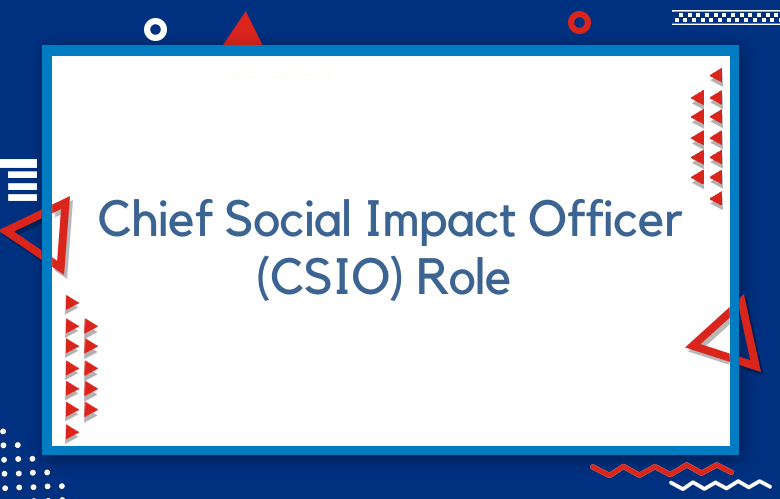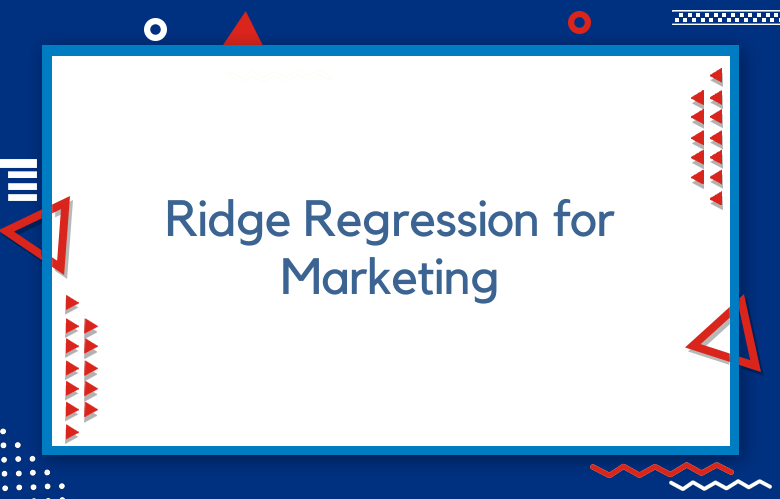Chief Social Impact Officer (CSIO) Role and Responsibilities

The Chief Social Impact Officer (CSIO) is a relatively new role in the corporate world. The CSIO is responsible for leading an organization’s social impact initiatives and strategies.
Chief Social Impact Officer (CSIO) Role and Responsibilities
As businesses increasingly prioritize social responsibility and sustainability, the role of the CSIO has become more critical, with organizations seeking leaders who can drive positive social impact and create long-term value for all stakeholders.
The Chief Social Impact Officer (CSIO) is a relatively new but increasingly vital role within forward-thinking organizations. It reflects a growing recognition of the importance of corporate social responsibility (CSR) and sustainable business practices.
The CSIO develops and oversees initiatives that contribute positively to society while aligning with the organization’s mission and business objectives. This role involves a strategic blend of social innovation, ethical leadership, and community engagement to create long-term value for the organization and the wider community.
Duties and Responsibilities
The CSIO’s duties and responsibilities may include:
Developing a Social Impact Strategy
The CSIO must develop and execute a comprehensive social impact strategy that aligns with the organization’s mission, values, and business objectives. They must identify social issues the organization can address through its products, services, and operations and develop initiatives and programs that drive positive social impact.
Stakeholder Engagement
The CSIO must engage with internal and external stakeholders, including employees, customers, suppliers, partners, and communities, to build support for the organization’s social impact initiatives and to drive social change. They must communicate the organization’s social impact goals and strategies to stakeholders and seek input and feedback to inform the development and execution of social impact initiatives.
Impact Measurement
The CSIO must develop and implement a robust impact measurement framework to track and analyze the effectiveness of social impact initiatives. They must use data and insights to assess the impact of social impact initiatives on stakeholders and communities and adjust strategies and programs as needed to drive more significant effects.
Partnership Development
The CSIO must develop partnerships with external organizations, such as non-profits, government agencies, and academic institutions, to leverage resources, expertise, and networks to drive more significant social impact. They must identify potential partners aligning with the organization’s social impact goals and develop mutually beneficial partnerships that drive social change.
Talent Development
The CSIO must develop and manage a team of social impact professionals, providing guidance, support, and mentorship to drive excellence in social impact initiatives. They must identify and attract top talent and create a culture of social impact excellence within the organization.
Sustainability Leadership
The CSIO must champion sustainability initiatives within the organization, working closely with other functional areas to integrate sustainability into the organization’s operations and supply chain. They must develop and execute sustainability strategies that align with the organization’s social impact goals and create long-term value for all stakeholders.
Shaping a Better World: The Role of a Chief Social Impact Officer
The Chief Social Impact Officer (CSIO) role has become increasingly important as businesses seek to create positive social and environmental impact while driving growth and profitability. The CSIO plays a critical role in defining and executing an organization’s social impact strategy, ensuring that social and environmental considerations are integrated into all aspects of the business.
The world faces numerous social and environmental challenges, from climate change and inequality to poverty and discrimination. These challenges pose significant risks to businesses, society, and the environment. To address these challenges, companies must adopt a holistic approach to sustainability, prioritizing social impact alongside financial performance.
The Chief Social Impact Officer (CSIO) role is becoming increasingly important as businesses recognize the need to prioritize social responsibility and sustainability. The CSIO is responsible for leading an organization’s social impact initiatives and strategies, driving positive social change, and creating long-term value for all stakeholders.
From Vision to Action: The Responsibilities of a CSIO
The Chief Social Impact Officer (CSIO) role is becoming increasingly important as businesses recognize the need to prioritize social responsibility and sustainability.
The CSIO is responsible for leading an organization’s social impact initiatives and strategies, driving positive social change, and creating long-term value for all stakeholders.
The CSIO’s responsibilities may include:
Developing a Social Impact Vision
The CSIO must develop a clear and compelling vision for the organization’s social impact initiatives, defining the organization’s social impact goals, priorities, and strategies. They must align the social impact vision with the organization’s overall mission and values and communicate the vision to internal and external stakeholders.
Creating a Social Impact Strategy
The CSIO must develop and execute a comprehensive social impact strategy that addresses critical social issues and drives positive social change. They must identify key social impact initiatives and programs, establish performance metrics, and allocate resources to achieve the organization’s social impact goals.
Engaging Stakeholders
The CSIO must engage with internal and external stakeholders, including employees, customers, suppliers, partners, and communities, to build support for the organization’s social impact initiatives. They must seek input and feedback from stakeholders to inform the development and execution of social impact strategies and must build relationships with stakeholders to drive social change.
Measuring Social Impact
The CSIO must develop and implement a robust impact measurement framework to track and analyze the effectiveness of social impact initiatives. They must use data and insights to assess the impact of social impact initiatives on stakeholders and communities and adjust strategies and programs as needed to drive more significant effects.
Building Partnerships
The CSIO must develop partnerships with external organizations, such as non-profits, government agencies, and academic institutions, to leverage resources, expertise, and networks to drive more significant social impact. They must identify potential partners aligning with the organization’s social impact goals and develop mutually beneficial partnerships that drive social change.
Managing Talent
The CSIO must develop and manage a team of social impact professionals, providing guidance, support, and mentorship to drive excellence in social impact initiatives.
They must identify and attract top talent, create a culture of social impact excellence, and develop a talent pipeline to ensure the organization has the skills and expertise needed to drive social impact.
Driving Sustainable Change: The Role of a Chief Social Impact Officer
The Chief Social Impact Officer (CSIO) is instrumental in driving sustainable change within organizations, spearheading initiatives that enhance corporate reputation and contribute to societal well-being and environmental sustainability.
In an era where businesses are increasingly held accountable for their social and environmental footprints, the CSIO’s role transcends traditional corporate boundaries, embedding social responsibility and sustainability into the core of business strategies.
Leading the Charge: The Responsibilities of a CSIO in Social Impact
The Chief Social Impact Officer (CSIO) plays a critical role in today’s business landscape as organizations seek to prioritize social responsibility and sustainability. The CSIO is responsible for leading the organization’s social impact initiatives, driving positive social change, and creating long-term value for all stakeholders.
The CSIO’s responsibilities may include:
Developing a Social Impact Strategy
The CSIO must develop and execute a comprehensive social impact strategy that addresses critical social issues and drives positive social change. They must identify key social impact initiatives and programs, establish performance metrics, and allocate resources to achieve the organization’s social impact goals.
Engaging Stakeholders
The CSIO must engage with internal and external stakeholders, including employees, customers, suppliers, partners, and communities, to build support for the organization’s social impact initiatives. They must seek input and feedback from stakeholders to inform the development and execution of social impact strategies and must build relationships with stakeholders to drive social change.
Measuring Social Impact
The CSIO must develop and implement a robust impact measurement framework to track and analyze the effectiveness of social impact initiatives. They must use data and insights to assess the impact of social impact initiatives on stakeholders and communities and adjust strategies and programs as needed to drive more significant effects.
Making a Difference: The Chief Social Impact Officer’s Role in Social Good
The Chief Social Impact Officer (CSIO) role is becoming increasingly important as businesses recognize the need to prioritize social responsibility and sustainability. The CSIO is responsible for leading an organization’s social impact initiatives and strategies, driving positive social change, and creating long-term value for all stakeholders.
The CSIO’s responsibilities may include:
Defining Social Impact Goals
The CSIO must define clear and measurable social impact goals that align with the organization’s mission and values. They must identify critical social issues the organization can address through its products, services, and operations and develop initiatives and programs that drive positive social impact.
Developing a Social Impact Strategy
The CSIO must develop and execute a comprehensive social impact strategy that addresses critical social issues and drives positive social change. They must identify key social impact initiatives and programs, establish performance metrics, and allocate resources to achieve the organization’s social impact goals.
Engaging Stakeholders
The CSIO must engage with internal and external stakeholders, including employees, customers, suppliers, partners, and communities, to build support for the organization’s social impact initiatives. They must seek input and feedback from stakeholders to inform the development and execution of social impact strategies and must build relationships with stakeholders to drive social change.
Measuring Social Impact
The CSIO must develop and implement a robust impact measurement framework to track and analyze the effectiveness of social impact initiatives. They must use data and insights to assess the impact of social impact initiatives on stakeholders and communities and adjust strategies and programs as needed to drive more significant effects.
Building Partnerships
The CSIO must develop partnerships with external organizations, such as non-profits, government agencies, and academic institutions, to leverage resources, expertise, and networks to drive more significant social impact. They must identify potential partners aligning with the organization’s social impact goals and develop mutually beneficial partnerships that drive social change.
Championing Sustainability
The CSIO must champion sustainability initiatives within the organization, working closely with other functional areas to integrate sustainability into the organization’s operations and supply chain. They must develop and execute sustainability strategies that align with the organization’s social impact goals and create long-term value for all stakeholders.
Fostering a Culture of Social Impact
The CSIO must foster a social impact culture, inspiring and empowering employees to contribute to social impact initiatives. They must develop training and development programs that build employee skills and knowledge in social impact and create incentives and rewards that recognize and reward social impact contributions.
Beyond Profits: The Responsibilities of a CSIO in Corporate Social Responsibility
The Chief Social Impact Officer (CSIO) is crucial in steering corporate social responsibility (CSR) efforts beyond the traditional confines of profit-making, ensuring that businesses serve broader societal and environmental objectives.
As companies increasingly recognize their role in addressing global challenges, the CSIO’s responsibilities have expanded to encompass various initiatives to generate positive social impact while aligning with business goals.
Conclusion:
As organizations increasingly recognize the importance of social impact and sustainability, the CSIO’s role will continue to evolve and become even more critical. By embracing the CSIO’s role and responsibilities, organizations can positively impact the world, differentiate themselves in a crowded marketplace, and create long-term value for their stakeholders and society.
The Chief Social Impact Officer is crucial in leading an organization’s social impact initiatives and strategies. By developing and executing a comprehensive social impact strategy, engaging with stakeholders, measuring impact, developing partnerships, managing talent, and championing sustainability, the CSIO can drive positive social impact and create long-term value for the organization and its stakeholders.



